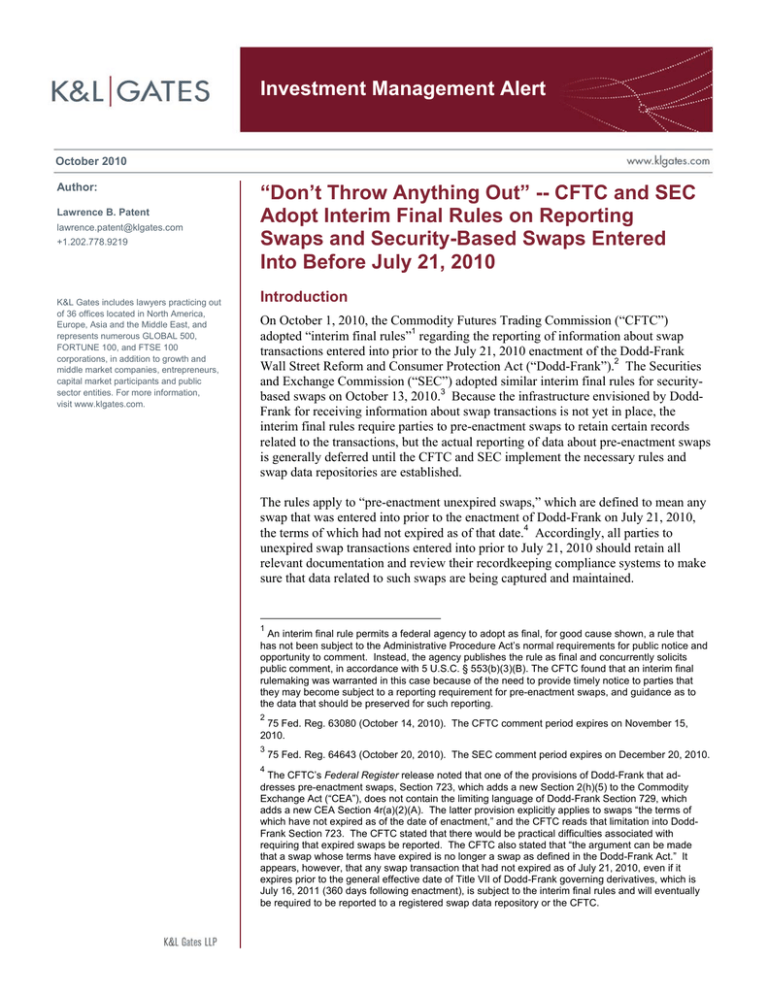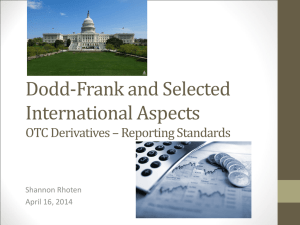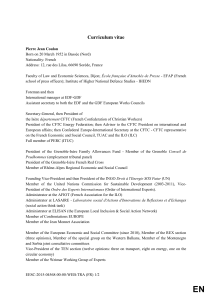
Investment Management Alert
October 2010
Author:
Lawrence B. Patent
lawrence.patent@klgates.com
+1.202.778.9219
K&L Gates includes lawyers practicing out
of 36 offices located in North America,
Europe, Asia and the Middle East, and
represents numerous GLOBAL 500,
FORTUNE 100, and FTSE 100
corporations, in addition to growth and
middle market companies, entrepreneurs,
capital market participants and public
sector entities. For more information,
visit www.klgates.com.
“Don’t Throw Anything Out” -- CFTC and SEC
Adopt Interim Final Rules on Reporting
Swaps and Security-Based Swaps Entered
Into Before July 21, 2010
Introduction
On October 1, 2010, the Commodity Futures Trading Commission (“CFTC”)
adopted “interim final rules”1 regarding the reporting of information about swap
transactions entered into prior to the July 21, 2010 enactment of the Dodd-Frank
Wall Street Reform and Consumer Protection Act (“Dodd-Frank”).2 The Securities
and Exchange Commission (“SEC”) adopted similar interim final rules for securitybased swaps on October 13, 2010.3 Because the infrastructure envisioned by DoddFrank for receiving information about swap transactions is not yet in place, the
interim final rules require parties to pre-enactment swaps to retain certain records
related to the transactions, but the actual reporting of data about pre-enactment swaps
is generally deferred until the CFTC and SEC implement the necessary rules and
swap data repositories are established.
The rules apply to “pre-enactment unexpired swaps,” which are defined to mean any
swap that was entered into prior to the enactment of Dodd-Frank on July 21, 2010,
the terms of which had not expired as of that date.4 Accordingly, all parties to
unexpired swap transactions entered into prior to July 21, 2010 should retain all
relevant documentation and review their recordkeeping compliance systems to make
sure that data related to such swaps are being captured and maintained.
1
An interim final rule permits a federal agency to adopt as final, for good cause shown, a rule that
has not been subject to the Administrative Procedure Act’s normal requirements for public notice and
opportunity to comment. Instead, the agency publishes the rule as final and concurrently solicits
public comment, in accordance with 5 U.S.C. § 553(b)(3)(B). The CFTC found that an interim final
rulemaking was warranted in this case because of the need to provide timely notice to parties that
they may become subject to a reporting requirement for pre-enactment swaps, and guidance as to
the data that should be preserved for such reporting.
2
75 Fed. Reg. 63080 (October 14, 2010). The CFTC comment period expires on November 15,
2010.
3
4
75 Fed. Reg. 64643 (October 20, 2010). The SEC comment period expires on December 20, 2010.
The CFTC’s Federal Register release noted that one of the provisions of Dodd-Frank that addresses pre-enactment swaps, Section 723, which adds a new Section 2(h)(5) to the Commodity
Exchange Act (“CEA”), does not contain the limiting language of Dodd-Frank Section 729, which
adds a new CEA Section 4r(a)(2)(A). The latter provision explicitly applies to swaps “the terms of
which have not expired as of the date of enactment,” and the CFTC reads that limitation into DoddFrank Section 723. The CFTC stated that there would be practical difficulties associated with
requiring that expired swaps be reported. The CFTC also stated that “the argument can be made
that a swap whose terms have expired is no longer a swap as defined in the Dodd-Frank Act.” It
appears, however, that any swap transaction that had not expired as of July 21, 2010, even if it
expires prior to the general effective date of Title VII of Dodd-Frank governing derivatives, which is
July 16, 2011 (360 days following enactment), is subject to the interim final rules and will eventually
be required to be reported to a registered swap data repository or the CFTC.
Investment Management Alert
Because the interim final rules of the CFTC and
SEC are virtually identical, this Alert will focus
upon the CFTC’s rules for brevity.
The Note does not require the creation or retention
of new records or the reformatting of existing
records.8
Data to be Reported and Records to be
Maintained
The interim final rules5 require that the reporting
party file with a registered swap data repository or
the CFTC (A) a copy of the transaction
confirmation, in electronic form if available or, if
not, in written form, and (B) the time, if available,
that the transaction was executed. The rules also
provide that the CFTC may request that any
information relating to the swap transaction be
reported to it, in a form and manner prescribed by
the CFTC. In a Note to the rules,6 the CFTC advises
all parties to pre-enactment swaps to retain the
following non-exclusive information:
During the interim period, the CFTC may request
that the information above, or any other information
relating to a pre-enactment unexpired swap, be
reported to the CFTC. The CFTC stated that any
information requests would vary depending upon
the CFTC’s needs, and may include actual as well
as summary trade data. Such summary data may
include a description of counterparties or the total
number of pre-enactment unexpired swaps and
some measure of their frequency and duration. The
CFTC further stated “that this requirement will
facilitate its ability to understand and evaluate the
current market for swaps and may inform its
analysis of other required rulemakings under the
Dodd-Frank Act.”
•
Any information necessary to identify and value
the transaction;
Who Must Report
•
The date and time of execution;
•
Information related to the price of the
transaction;7
•
Whether the transaction was accepted for
clearing and, if so, the identity of the clearing
organization;
•
Any modification(s) to the transaction; and
•
The final confirmation of the transaction.
5
The interim final rules are set forth in a new Part 44 of the
CFTC’s regulations, including definitions in Regulation 44.00,
effective date in Regulation 44.01 (immediately upon
publication in the Federal Register), and reporting
requirements in Regulation 44.02.
6
The parties that will be required to report preenactment unexpired swap transactions are
identified as follows: (1) with respect to a swap in
which only one party is a swap dealer (“SD”) or
major swap participant (“MSP”), that entity is
responsible for reporting the swap; (2) with respect
to a swap in which one party is an SD and the other
party is an MSP, the SD must report the swap; and
(3) with respect to any other swap (such as between
two commercial end-users), the parties shall select
one of them to report the swap.9 Because it is not
yet clear who will come within the category of SD
and MSP, all parties to swaps should retain records
related to the transactions in case it turns out that
they will have a general reporting obligation, or to
respond to special requests from the CFTC.
The Note appears at the end of Regulation 44.02(a).
7
The phraseology used by the SEC in its interim final rules,
Section 240.13Aa-2T, is “all information from which the price of
the transaction was derived.” The SEC stated that this
included, among other things, the quoting convention. For
example, for credit default swaps, the quoting convention is
expressed as a number of basis points per annum (variously
referred to as the traded, quoted or composite spread), and for
equity or loan total return swaps, the quoting convention is the
LIBOR-based Floating Rate Payment, expressed as a floating
rate plus a fixed number of basis points multiplied by the
notional amount of the transaction.
8
The SEC noted that the time of execution is not a data
element that is consistently captured for security-based
swaps, particularly because many of these transactions are
concluded by telephone. The SEC therefore recognizes that it
may not be possible to have a record of the time of execution
for certain pre-enactment security-based swaps.
9
The reporting party provisions are set forth in new CEA
Section 4r(a)(3) and Regulation 44.02(b).
October 2010
2
Investment Management Alert
Implementation Schedule and
Questions
Dodd-Frank Section 729 requires the CFTC to
promulgate an interim final rule providing for the
reporting of pre-enactment unexpired swap
transactions by October 19, 2010. That section of
Dodd-Frank requires that pre-enactment unexpired
swap transactions be reported to a registered swap
data repository or the CFTC within 30 days after
issuance of the interim final rule (November 1,
2010), or “such other period as the [CFTC]
determines to be appropriate.” The CFTC noted that
a November 1, 2010 reporting date is impractical
because (1) there are no registered swap data
repositories at this time; (2) the CFTC is not
prepared to accept swap data; and (3) the CFTC has
not adopted regulations to govern the registration of
SDs and MSPs, or the reporting and maintenance of
swap data, and is not required to do so until July 16,
2011.
Dodd-Frank Section 723 requires that pre-enactment
swaps be reported to a registered swap data
repository or the CFTC no later than 180 days after
the effective date of that section, which is January
17, 2012. That would appear to be a more likely
date for general reporting of data on pre-enactment
unexpired swaps, presuming that the regulations to
implement registration of swap data repositories,
SDs and MSPs are adopted by July 16, 2011. These
issues illustrate the fact that, although there is a
general effective date for the regulations to
implement Title VII of Dodd-Frank of July 16,
2011, it will be necessary to establish new types of
entities such as swap data repositories, process their
registration applications, and test electronic data
reporting mechanisms before these regulations can
be fully implemented. Resolution of these issues
will undoubtedly take some period of time beyond
the July 16, 2011 general effective date.
Extra-Territoriality Issues
Dodd-Frank Section 722(d) states that Title VII
thereof shall not apply to activities outside of the
United States unless those activities (1) have a direct
and significant connection with activities in, or
effect on, commerce of the United States; or
(2) contravene CFTC regulations promulgated to
prevent the evasion of Dodd-Frank. However,
Dodd-Frank does not make explicit distinctions
between U.S. and non-U.S. swaps, SDs or MSPs.
Therefore, it would appear that any U.S.-located
party would be subject to the recordkeeping and
reporting requirements, and any party, even if
located outside of the United States, that has entered
into a pre-enactment unexpired swap with a U.S.located party should retain all of its records
pertaining to such swaps and be prepared to report
such data at some future date. If both parties to preenactment unexpired swaps are located outside of
the United States, such transactions are likely to be
considered outside of the coverage of Dodd-Frank.
However, if there is any doubt that such transactions
could have a direct and significant connection with
activities in, or effect on, commerce of the United
States, the parties thereto may be prudent to retain
what records they have until there is further
guidance from the CFTC concerning recordkeeping,
reporting and extra-territoriality issues.
Conclusion
The theme of this Alert is, with respect to preenactment unexpired swaps and security-based
swaps, first, do not throw anything out. Although it
appears unlikely that there will be any general
reporting obligation for such swaps until early 2012,
the CFTC and SEC reserve the right to request any
information relating to pre-enactment unexpired
swaps and security-based swaps, respectively, so
parties thereto must be prepared to comply with
such a request. Parties that engage in swaps and
security-based swaps should also be mindful that,
even if they are not classified as SDs, MSPs,
security-based swap dealers or major security-based
swap participants and may continue to engage in
swaps and security-based swaps without being
required to trade on a trading facility and clear
through a central counterparty, Dodd-Frank
mandates that all swap and security-based swap
transactions be reported to a registered swap data
repository or the CFTC or SEC. Parties should
therefore review their recordkeeping compliance
systems to make sure that data related to swaps and
security-based swaps are being captured and
maintained, so that the data can be reported, if
necessary. Commercial end-users that anticipate
being exempt from most of the new requirements of
Dodd-Frank, particularly if they enter into
transactions with other commercial end-users,
should keep the reporting obligations in mind,
because where the parties are both commercial endOctober 2010
3
Investment Management Alert
users, one of them will be required to report
information. For swaps being entered into after the
enactment of Dodd-Frank, where it is not clear
which party to a transaction will have the reporting
obligation, the parties may also want to specify in
any new agreements which party will have the
reporting obligation and price the deals accordingly.
Anchorage Austin Beijing Berlin Boston Charlotte Chicago Dallas Dubai Fort Worth Frankfurt Harrisburg Hong Kong London
Los Angeles Miami Moscow Newark New York Orange County Palo Alto Paris Pittsburgh Portland Raleigh Research Triangle Park
San Diego San Francisco Seattle Shanghai Singapore Spokane/Coeur d’Alene Taipei Tokyo Warsaw
Washington, D.C.
K&L Gates includes lawyers practicing out of 36 offices located in North America, Europe, Asia and the Middle East, and represents numerous
GLOBAL 500, FORTUNE 100, and FTSE 100 corporations, in addition to growth and middle market companies, entrepreneurs, capital market
participants and public sector entities. For more information, visit www.klgates.com.
K&L Gates comprises multiple affiliated entities: a limited liability partnership with the full name K&L Gates LLP qualified in Delaware and
maintaining offices throughout the United States, in Berlin and Frankfurt, Germany, in Beijing (K&L Gates LLP Beijing Representative Office), in
Dubai, U.A.E., in Shanghai (K&L Gates LLP Shanghai Representative Office), in Tokyo, and in Singapore; a limited liability partnership (also named
K&L Gates LLP) incorporated in England and maintaining offices in London and Paris; a Taiwan general partnership (K&L Gates) maintaining an
office in Taipei; a Hong Kong general partnership (K&L Gates, Solicitors) maintaining an office in Hong Kong; a Polish limited partnership (K&L
Gates Jamka sp.k.) maintaining an office in Warsaw; and a Delaware limited liability company (K&L Gates Holdings, LLC) maintaining an office in
Moscow. K&L Gates maintains appropriate registrations in the jurisdictions in which its offices are located. A list of the partners or members in each
entity is available for inspection at any K&L Gates office.
This publication is for informational purposes and does not contain or convey legal advice. The information herein should not be used or relied upon
in regard to any particular facts or circumstances without first consulting a lawyer.
©2010 K&L Gates LLP. All Rights Reserved.
October 2010
4



